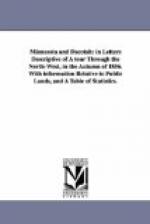a defendant could plead to an action of assumpsit
just as many defences as he chose; first, he could
deny the whole by pleading the general issue; then
he could plead the statute of limitations, infancy,
accord and satisfaction, and a dozen other pleas,
by which the plaintiff would be deprived of any clue
to the real defence. I suppose it was this practice
of formal lying which has given rise to the popular
error that a lawyer is in the habit of lying, or is
obliged to lie, in his arguments. Many people
do not know the difference between pleading—
which is a process in writing to bring the parties
to an issue— and the oral arguments of counsel
in courts. It is ridiculous to suppose that it
is easy or profitable for lawyers to make false statements
in their arguments. The opposing counsel is ready
to catch at anything of the kind; and if he misstates
the evidence, the jury are aware of it; while if he
states what is not law, the court generally knows
it. So there is no opportunity for lying even
if a lawyer should be so disposed. The practice
in civil actions as provided by the statutes of Minnesota
is similar— if not actually the same—
to the New York code of practice. There is but
one form of action, called an action of contract.
The only pleading on the part of the plaintiff is,
1st, the complaint; 2d, the reply. On the part
of the defendant, 1st, demurrer; or 2d, the answer.
(Stats. ch. 70, sec. 58.) The complaint must contain,
1st, the title of the cause, specifying the name of
the court in which the action is brought and the names
of the parties to the action, plaintiff and defendant;
2d, a statement of the facts constituting the cause
of action in ordinary and concise language, without
repetition, and in such a manner as to enable a person
of common understanding to know what is intended; 3d,
a demand of the relief to which the plaintiff supposes
himself entitled. If the recovery of money be
demanded the amount must be stated. (Ibid. sec. 59.)
While testifying my approval of this code of practice
as a whole, I cannot resist saying that in many respects
it is not so systematic as the Massachusetts code,
which was devised by Messrs. Curtis (now Mr. Justice),
Lord, and Chapman. That code is one of the best
in the world. And if I may be allowed one word
more about special pleading, I would say that there
is no branch of law which will better reward study.
Without mentioning the practice in the U. S. courts,
which requires, certainly, a knowledge of special
pleading, no one can read the old English reports
and text books with much profit, who is ignorant of
the principles of that science.
A class of business peculiar to new territories and
states arises from the land laws. A great many
pre-emption cases are contested before the land officers,
in which the services of lawyers are required.
This fact will partly explain why there are, generally,
so many lawyers located in the vicinity of a land
office. In a community that is newly settled
the title to property must often be in dispute; and
however much averse people may be to going to law,
they find it frequently indispensable, if they wish
to have their rights settled on a firm basis.




